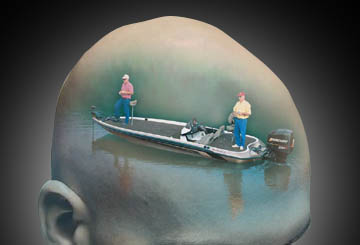Levels of the Game: Recent performance-psychology research

The foundation of performance psychology has been built by academic researchers, the scientists whose tireless laboratory work eventually leads to the practical exercises presented in books and articles such as this. This month I will highlight recent research findings that can benefit anglers, with emphasis on Levels of the Game suggestions for beginner, intermediate and advanced competitors.
One recent set of studies highlighted the importance of self-acceptance as a precursor to optimal performance. This, of course, is not new information. It is a well-known paradox in psychology that realistically accepting yourself and your current skill set, regardless of how good or bad that might be, best prepares you to improve. It seems contradictory to say, “I’m fine where I’m at right now,” especially after a lousy day on the lake. What often happens with genuine self-acceptance, however, is a kind of relaxed awareness and openness that allows new learning to happen.
It’s actually easier to see this from the negative side. Ever been in a tournament where you did so poorly that you put the boat on the trailer in disgust and said, “@^$%…I’m going home!”? Right, we’ve all done that. But what did we miss in the process? For starters, leaving in a dejected huff eliminates any chance of finding out what the tournament winners did. Far more valuable than pretournament dock talk are the post-event discussions among high finishers. Many times loose-lipped winners have revealed techniques or spots or systems that later turn out to be helpful. This is information you won’t get if you are so unhappy with yourself and your performance that you bail out early.
Even a beginner can eat a little humble pie and stick around after tournaments long enough to listen. Intermediate and advanced anglers will accept poor performances as part of the process of fishing (even Joe Mauer strikes out now and then). These anglers will actively seek out the top performers and ask questions. They will not let foolish pride prevent them from acquiring new knowledge.
Another research team looked at how different visualization techniques benefit pingpong players. OK, so it’s not fishing, but get this: The scientists found that visualizing the path of the ball on a competitor’s best shot was less effective than visualizing the movement of one’s arm on a great shot. So let’s say you want to become more accurate pitching plastics to bushes; make a series of pitches (from your boat or in the backyard), and instead of looking at a target, watch how your arm, your wrist and your hand move. In some cases, your lure will wind up in a crazy location, but a few pitches will be right on the money. When that happens, you are left with an accurate visual image of what your arm, wrist and hand muscles are doing when you make a good pitch. The next time you’ve got free time (in line at the boat ramp waiting to launch?), you can do visualization practice. This might seem crazy, but I’ve seen it work with tennis players, with racquetball guys and with golfers. It can improve your game too.
And finally, there has been some fascinating research lately on how and when intuitive decision-making does or does not work. Anglers, especially tournament guys, talk about the importance of trusting intuitions, or “going with gut-level reactions.” Personally, I’ve never been a big fan of thinking with my stomach. It just makes sense to use your brain rather than your colon to sort out information in order to make intelligent decisions, and recent research agrees with this proposition.
If you are honest with yourself and candid about your experience, you will notice what scientists have observed: Hunches, intuitions and gut impressions are wrong a lot more than they are right. Sure, you can remember a time when you acted on a wild idea and hit a big fish, or maybe a school of big ones. But what you fail to remember are all the times you did that and struck out. It’s like remembering the time you held 8-9-J-Q in poker and hit the 10 on the last card. Lucky you! However, that is still a bad bet.
That said, the right kind of intuition can be useful in fishing, because none of us can ever know or analyze all the variables. We have to make educated guesses that rely on partial information that, as we also know, is constantly changing. However, research clearly shows that the best intuitive decision-makers have collected a lot of concrete information and have analyzed that information very carefully prior to making an intuitive choice. Trust your gut, then, but only after you have done as much homework as you possibly can.
If you are an advanced angler, remember that analytical types will beat intuitive types more often than not. So, yes, you should carefully study lake maps, check water temps and forage options, and ask as many questions as possible of people who are subject-matter experts. Hone your fish-finding skills through trial and error, remember and learn from your mistakes, and build your repertoire of experience. If you do that, your intuitions will be worth something. On the other hand, intuitive is just a fancy word for impulsive if you don’t have any real data or experience to back up your decisions.

————————————————–
Jay T. McNamara, Ph.D., L.P., also known as Dr. Fish, recently finished his book “The Psychology of Exceptional Fishing.” You can order it by contacting Jay via e-mail at this address: [email protected].
————————————————–
Jay T. McNamara, Ph.D., L.P., is a psychologist, who is also an avid bass and walleye angler. With more than 26 years of professional experience complemented by participation in competitive fishing at local and national levels, he is uniquely qualified to illustrate how performance psychology principles apply to tournament fishing.